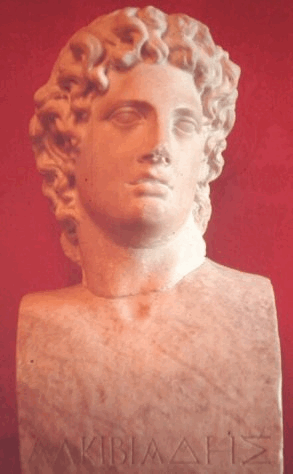Spring 2010
Time and Location 
W Period 9-11, 125 Dauer Hall
Course Description
A preeminent political figure of classical Athens during some of its most turbulent times, Alcibiades was a lightning rod for the policies that he advocated, the lifestyle he lived, and the manner in which he pursued his political ambition. Using Alcibiades as a focal point, this course considers the political, social, and cultural changes that Athens faced during the late fifth century, with particular attention to the Profanation of the Mysteries, the Sicilian Expedition, the rule of the Four Hundred, and the Athenian surrender to Sparta.
Texts
Required
- Kagan, Donald. 2004. The Peloponnesian War. New York: Penguin.
- Munn, Mark. 2003. The School of History: Athens in the Age of Socrates. Berkeley: University of California Press.
- Vickers, Michael. 2008. Sophocles and Alcibiades: Athenian in Ancient Greek Literature. Cornell: University of Cornell Press.
- Wohl, Victoria. 2002. Love Among the Ruins: The Erotics of Democracy in Classical Athens. Princeton: University of Princeton
Recommended
- Ober, Josiah. 2001. Political Dissent in Democratic Athens. Princeton: Princeton University Press.
Course Requirements
- Class Participation (15%) based on participation in weekly discussions. No unexcused absences.
- Presentations (15%). Each student will present to the class his/her findings from work on the term paper.
- One Term Paper (70%), approximately 5,000-6,000, not including footnotes and bibliography
- Abstract and Bibliography, due March 24 (5% reduction of grade on term paper if not handed in at the start of class; 2.5% reduction if assignment is incomplete)
- Outline due March 31 (5% reduction of grade on term paper if not handed in at the start of class; 2.5% reduction if assignment is incomplete)
- First Draft, due April 14 (10% reduction of grade on term paper if first draft is not handed in at the start of class; 5% reduction if first draft is incomplete)
- Final Draft, due April 28
Schedule
Part 1: Alcibiades in History
January 6
- Kagan, Peloponnesian War (be sure to have read and be ready to discuss this work for our first class on January 6)
January 13
- Munn, School of Hellas, Chapters 1-8
January 27
- Ellis, Alcibiades (will be circulated)
- Bloedow, Edmund, “Alcibiades ‘Brilliant’ or ‘Intelligent’?” Historia 41 (1992) 139-57 (availble on JSTOR, Stable URL: http://www.jstor.org/stable/4436234
February 3
- Furley, Andokides and the Herms: A Study of Crisis in Fifth-Century Athenian Religion, introduction, chapters 1-3, 5-6 (will be circulated)
- Murray, “The Affair of the Mysteries: Democracy and the Drinking Group,” in Sympotica: A Symposium on the Symposion, edited by O. Murray (will be circulated)
- McGlew, “Politics on the Margins: The Athenian ‘Hetaireiai’ in 415 B.C.” Historia 48 (1999) 1–22 (available on JSTOR)
- Gagné, “Mystery Inquisitors: Performance, Authority, and Sacrilege at Eleusis” CA 28 (1999) 211–47 (available on JSTOR)
- Todd, “Revisiting the Herms and the Mysteries,” in Law, Rhetoric, and Comedy in Classical Athens, edited by D.L. Cairns, and R.A. Knox (will be circulated)
Part 2: Alcibiades in the Greek Imaginary
February 10
- Forde, The Ambition to Rule: Alcibiades and the Politics of Imperialism in Thucydides (will be circulated)
- Ober, Political Dissent in Democratic Athens, chapter 2e
February 17
- Gribble, Alcibiades and Athens (will be circulated)
February 24
- Russell, Plutarch, chapters 6-7 (will be circulated)
- Halliwell, “Traditional Greek Conceptions of Character,” in Characterization and Individuality in Greek Literature, edited by C. Pelling (will be circulated)
- De Blois et al., eds., The Statesman in Plutarch’s Works, 157–78 (will be circulated)
- Pelling, “How Far would they Go? Plutarch on Nicias and Alcibiades,” in Literary Texts and the Historian (will be circulated)
- ———- , “Is Death the End? Closure in Plutarch’s Lives,” in Classical Closure: Reading the End in Greek and Latin Literature, edited by F. Dunn et al. (will be circulated)
March 3
- Vickers, Sophocles and Alcibiades
March 17
- Wohl, Love Among the Ruins: The Erotics of Democracy in Classical Athens
- Shapiro, “Alcibiades: the Politics of Personal Style,” in Art in Athens during the Peloponnesian War, edited by O. Palagia (will be circulated)
Part 3: Paper
March 24
- Abstract and Bibliography due
- Group workshop
March 31
- Outline due
- Individual meetings
April 7
- Presentations
April 14
- Presentations
- First draft due
April 21
- Presentations
Grading Scale
A = 90-100%
A- = 87-89.9%
B+ = 84-86.9%
B = 80-83.9%
B- = 77-79.9%
C+ = 74-76.9%
C = 70-73.9%
C- = 67-69.9%
D+ = 64-66.9%
D = 60-63.9%
D- = 57-59.9%
E < 57%
Policies
- Students are expected to complete all requirements on the specified dates and will not be granted an alternate date unless they have an acceptable reason for their absence as specified in the graduate catalog, fulfill the conditions described therein, and provide timely notification. See Graduate Catalog.
- Students are required to be honest in their coursework. Any act of academic dishonesty will be reported to Student Judicial Affairs, and may result in failure of the assignment in question and/or the course. See Honor Code.
- Students seeking special accommodations, need to submit such requests to the Disability Resource Center prior to the deadline of the scheduled requirement, and preferably as early in the Semester as possible. For further information, see the Disability Resource Center.
- Students facing difficulties completing the course or who are in need of counseling or urgent help may call the on-campus counseling center: 352-392-1575, or the student mental health center: 352-392-1171.